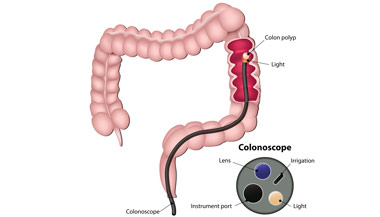Colon Cancer: Diagnosis and Staging
Reviewed By:
"Is it cancer?" If your gastroenterologist has recently found — and removed — a suspicious-looking polyp during your colonoscopy, you likely have many questions as you await definitive test results.
Many polyps aren’t cancerous. For the ones that are, effective treatment options are available to remove cancerous growths and target symptoms so you can feel better and live a full life.
Prompt treatment for colon cancer is your best chance for recovery. Here’s what Johns Hopkins gastroenterologist Reezwana Chowdhury, M.D., wants you to know about the first steps of colon cancer diagnosis and staging.

Colon Cancer Diagnosis: Getting a Colonoscopy
Most colorectal cancers start as colon polyps, abnormal growths in the wall of the colon. Some polyps can develop into cancer if left untreated for a long time (usually at least 10 years).
Screening is crucial for cancer detection because most colorectal cancers don’t cause symptoms in the early stages. Many times, doctors first spot colon cancer during a routine screening colonoscopy. During a colonoscopy:
- Your gastroenterologist uses a flexible tube with a camera at the end to look at the insides of your colon. (You are given a sedative before the procedure so you are relaxed and comfortable.)
- If any colon polyps are found, doctors can remove them during the procedure.
Colon Cancer Diagnosis: Unusual Symptoms
Other times, your doctor might order a colonoscopy or other test (such as a CT scan) to investigate certain symptoms that could point to colorectal cancer.
The most common sign of colon cancer is bowel changes. Although many other, often routine, health issues can cause bowel changes, please see your doctor for a thorough evaluation if you experience:
- A change in bowel habits (suddenly becoming constipated, for example)
- Rectal bleeding
- Dark stools, or blood in your stools
Colon Cancer: How Doctors Stage Colon Cancer
If your gastroenterologist determines a colon polyp is cancerous, you may need additional imaging tests such as a CT scan to confirm and possibly stage the cancer.
Staging refers to how far a cancer has spread. This will also help determine your treatment.
Stage 1 and 2 colon cancer: Confined to the colon wall
Stage 3 colon cancer: Has spread to nearby lymph nodes
Stage 4 colon cancer: Has spread to distant organs, such as the liver or lungs
Doctors often recommend surgery for colon cancer treatment, explains Chowdhury. While surgery may be an effective treatment for many with colorectal cancer, it is important to seek out an experienced physician for your own case






